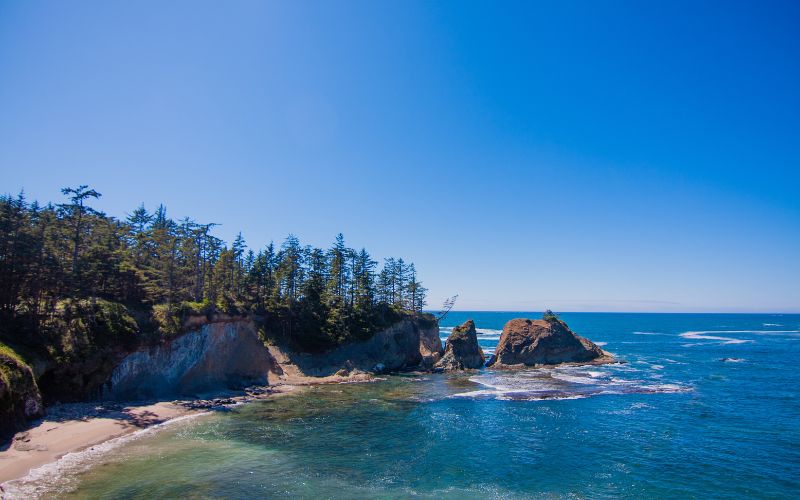
- Details
- By Elyse Wild
The decision, finalized on Tuesday, authorizes approximately 195,012 acres for wind energy development off the coast of Coos Bay and Brookings in areas within the ancestral territory of the Confederated Tribes of the Coos, Lower Umpqua, and Siuslaw Indians. The area also contains viewsheds of significant cultural and historic significance to the Tribes, as well as important Tribal fishing areas.
Tribal Council Chair Brad Knepper said in a statement that BOEM’s consultation with the Tribe regarding the wind energy project was inadequate and that the Tribe learned of BOEM’s impending decision on Monday from officials in the Oregon Governor’s office.
“BOEM’s press release states that it has ‘engaged’ with the Tribe, but that engagement has amounted to listening to the Tribe’s concerns and ignoring them and providing promises that they may be dealt with at some later stage of the process,” Kneaper said.
In November 2023, the Tribal Council unanimously passed a resolution expressing its opposition to offshore wind energy development off the Oregon Coast. According to a statement, the Tribe submitted comments that same month, raising concerns about wind energy development and
requesting that important, cultural viewsheds be excluded from the wind energy areas and that wind development avoid areas critical to resident and migratory species, including important areas for fishing.
In an October 31, 2023 letter to BOEM, the Tribe called upon BOEM to halt its process to allow for consideration of impacts of wind energy, including consideration of a congressionally mandated National Academy of Science study on wind energy impacts to fisheries on the West Coast.
The Tribe’s concerns echo the concerns of other local governments, including Lane County and Coos County, which has expressed opposition to wind energy development, and resolutions of regional and national tribal organizations, including the National Congress of American Indians,
which has called for a halt to the approval process until BOEM develops a process to consider Tribal impacts.
According to Oregon Public Broadcasting, a draft of the wind energy area that was released last year drew 1,1000 public comments and calls from the Governor’s office for more research on the potential cultural, wildlife and environmental impacts.
"BOEM has failed to recognize that wind development has impacted the Tribe and has failed to assure that wind energy development will do good and not harm the Tribe, its members, and the greater coastal community," Kneaper said. "The Tribe will not stand by while a project is developed that causes it more harm than good – this is simply green colonialism.”
Tribal Chief Doug Barrett said in a statement that for the Tribe, the wind energy area is tied to religious beliefs and traditional practices and is a cornerstone to its way of life.
"As a confederation of coastal tribes deeply dependent on the Ocean and its rich resources, we assert a direct interest in the viewshed extending from our shores, encompassing a distance of at least twelve nautical miles beyond the continental shelf.
"We believe it is our inherent right to have the ability to see across our viewsheds, as this direct connection is integral to our cultural practices and traditional way of life. This connection empowers us to protect and conserve our cultural resources for the prosperity of our future generations."
More Stories Like This
Gwich'in Tribal Governments Submit Comments Challenging Fish and Wildlife Service's Inadequate Environmental Review of Arctic Refuge Snow RoadRappahannock Tribe Challenges 9M-Gallon Water Plan
Feds release draft long-term plans for Colorado River management
Apache Leader Walks 60 Miles to Court Hearing That Will Decide Fate of Sacred Oak Flat
Rappahannock Tribe Raises Sovereignty and Environmental Concerns Over Caroline County Water Permit
Help us defend tribal sovereignty.
At Native News Online, our mission is rooted in telling the stories that strengthen sovereignty and uplift Indigenous voices — not just at year’s end, but every single day.
Because of your generosity last year, we were able to keep our reporters on the ground in tribal communities, at national gatherings and in the halls of Congress — covering the issues that matter most to Indian Country: sovereignty, culture, education, health and economic opportunity.
That support sustained us through a tough year in 2025. Now, as we look to the year ahead, we need your help right now to ensure warrior journalism remains strong — reporting that defends tribal sovereignty, amplifies Native truth, and holds power accountable.
 The stakes couldn't be higher. Your support keeps Native voices heard, Native stories told and Native sovereignty defended.
The stakes couldn't be higher. Your support keeps Native voices heard, Native stories told and Native sovereignty defended.
Stand with Warrior Journalism today.
Levi Rickert (Potawatomi), Editor & Publisher


